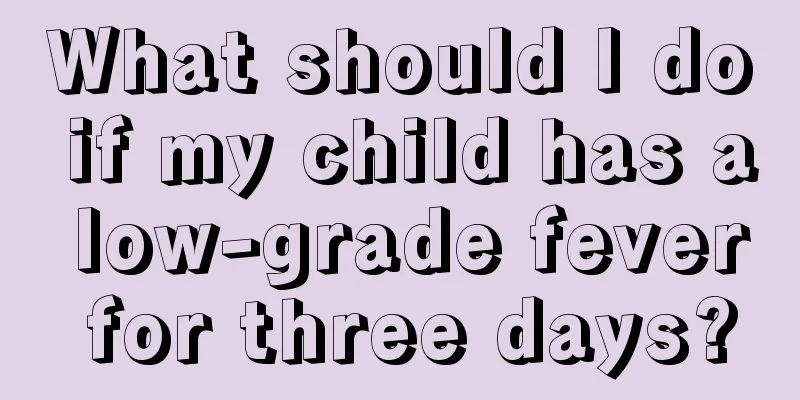What should I do if my child has a low-grade fever for three days?

|
When a baby becomes sick, many parents immediately wrap their children in a thick quilt or put on thick clothes when going out, believing that this is the only way to prevent the cold wind from invading the body and worsening the condition. However, patients with a low fever should not wear excessive clothes, because a low fever usually causes children to become drowsy, physically weak, and have a poor appetite. These require corresponding preventive treatments. 1. Wear the right amount of clothing Pay attention to adding or removing clothes. Don't wear too many clothes to facilitate heat dissipation, but don't wear too few clothes to avoid cold. If you are very hot, take off excess clothing to allow the body heat to dissipate. But if you shiver, wrap yourself in clothes until you are no longer cold. Pay special attention to young babies, as they may not know how to remove clothing if they overheat. In fact, wearing too many clothes or being in a very hot place may cause a fever. 2. Adjust the indoor temperature Try to create a ward atmosphere that is conducive to the patient's recovery. Do not allow the room temperature to be too high, not exceeding 18.3°C. At the same time, the room should be properly ventilated to increase heat dissipation from the skin to help recovery, but do not use ventilation equipment. And keep the light soft to make the patient relax. 3. Seek medical attention if the condition is serious If the low-grade fever persists for a long time and seriously affects your life, it is recommended to seek medical treatment. It may also be caused by other diseases. If a low-grade fever persists, it may be caused by chronic inflammation, and it will get better once the inflammation subsides. Low-grade fever is also a self-protection measure Generally, a low fever is a defensive measure for the body to resist disease and protect itself, so if the fever is below 38.5 degrees, it is not very uncomfortable and it is generally not recommended to reduce the fever. Don't take antipyretics. Antipyretics are only symptomatic treatments and cannot eliminate the cause of the disease. Before a clear diagnosis, do not abuse antipyretics at will, so as not to mask the condition, affect diagnosis, and delay treatment. In particular, if a low-grade fever persists, you should seek medical attention as soon as possible and undergo a comprehensive examination. The early symptoms of some malignant tumors or bacterial infections are also low-grade fever. Many people may choose to take some antipyretics when they find themselves with low-grade fever. However, if the low-grade fever is caused by other diseases, taking medicine at will will delay the disease. |
<<: How to deal with a low-grade fever in a three-year-old child
>>: What should I do if my child has a low-grade fever for two days?
Recommend
How to treat children's hunchback better
If a child develops hunchback, it is very worryin...
How much honeysuckle should be used for bathing the baby
Honeysuckle is a common Chinese medicinal materia...
Can I bathe my baby right after waking up?
Babies also need to take a bath regularly, otherw...
Why does my baby sweat coldly?
Compared with adults, babies' immunity is rel...
What specialties should children learn?
Many parents are very concerned about their child...
Why does my child have trouble breathing when sleeping at night?
Generally, people will find many respiratory prob...
Newborn baby keeps making goose sounds?
If a newborn baby always makes goose-like sounds,...
Why does my baby have pain around his belly button?
Pain around the baby's belly button is a comm...
What to do if your child has freckles on his face
Freckles are a skin disease that we are very fami...
Why does a 2-year-old baby cry when sleeping?
We all know that babies have different growth and...
How to check what the child lacks
The human body contains a certain amount of nutri...
What to do if your newborn's legs are bent
Every parent is particularly concerned about the ...
Does hand, foot and mouth disease cause red spots all over the body?
The physical condition of the baby has always bee...
What are the treatments for rhinitis in children?
Young children's physical development is not ...
What are some good ways to treat tooth decay in children?
If a child has tooth decay, it will cause great h...









